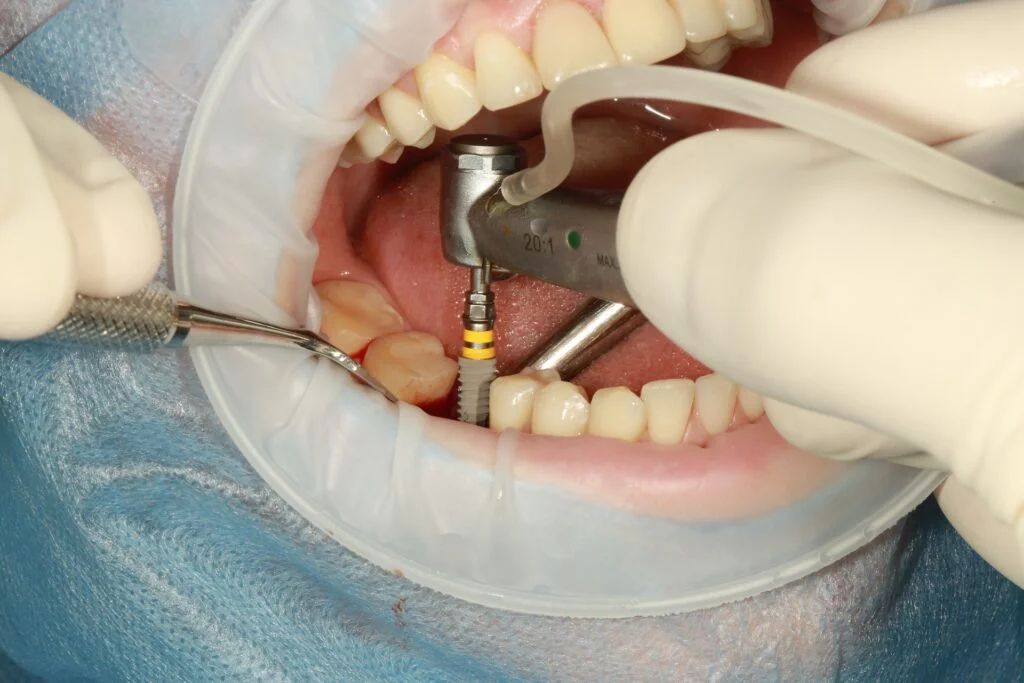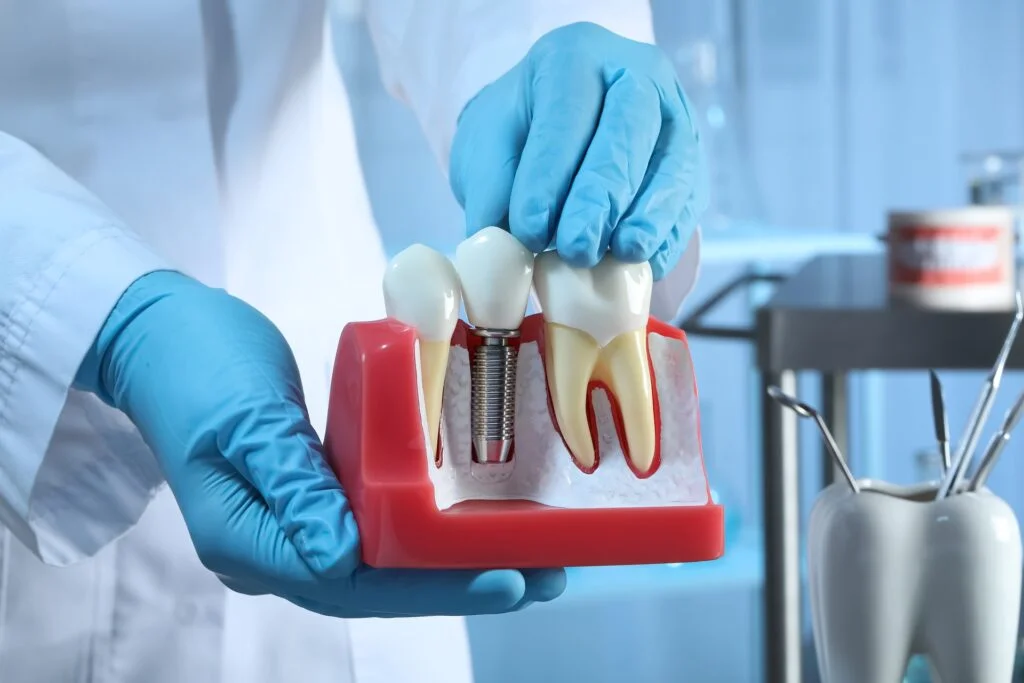What are dental implants?
Dental implants are advanced tooth replacements that provide a long-lasting solution for missing teeth. Surgically placed into the jawbone, these titanium posts act as artificial roots, creating a stable foundation for custom-made crowns, bridges, or dentures. Not only do dental implants enhance appearance and boost confidence, but they also offer improved speech, comfort, and convenience compared to traditional dentures. Their durability and ability to preserve jawbone structure make them a popular choice, ensuring a natural look and feel for a lifetime.
How Do Dental Implants Work?
Dental implants are like artificial tooth roots. A small titanium post is placed in your jawbone during a minor surgery. Over time, your bone and the implant bond together, making a sturdy base. Then, a connector called an abutment is attached, and a custom-made tooth, bridge, or denture is placed on it. This new tooth looks and works just like your real ones. It helps you chew, talk, and smile comfortably. Dental implants give you a natural, confident smile that lasts a lifetime.
How Should I Prepare for a Dental Implant?
Preparing for a Dental Implant:
- Consultation: Schedule a consultation with your dentist for a comprehensive oral health assessment, including X-rays and impressions.
- Address Dental Issues: Any existing dental problems like gum disease or decay will be treated before the implant procedure.
- Pre-Surgery Guidelines: Follow specific instructions from your dentist, including fasting before surgery if anesthesia is involved.
- Arrangement for Transportation: Plan for someone to accompany you and drive you home post-surgery due to potential grogginess from anesthesia.
- Follow Pre-Surgery Instructions: Adhere to guidelines, such as avoiding certain medications or supplements that might interfere with the procedure or increase bleeding risks.
- Prepare for Recovery: Plan a soft-food diet for the days after surgery, stock up on prescribed medications and pain relievers.
- Create a Comfortable Recovery Space: Arrange your home with extra pillows and entertainment for a comfortable healing environment.
What Happens During Dental Implant Surgery?
After Dental Implant Placement:
- Healing Period: Allow several months for the implant to fuse with the jawbone (osseointegration) to ensure stability.
- Follow-Up Appointments: Regular visits to the dentist to monitor the healing process and check the implant’s integration.
- Abutment Attachment: Once integrated, an abutment is placed on the implant, protruding above the gum line for the final restoration.
- Impressions: Dental impressions are taken to create a customized crown, bridge, or denture that fits perfectly on the abutment.
- Final Restoration: The personalized restoration is securely attached to the abutment, completing the implant process.
- Oral Care: Maintain excellent oral hygiene, including regular brushing, flossing, and dental check-ups, to ensure the longevity of the implant.
- Dietary Considerations: Initially, stick to soft foods to avoid pressure on the implant site, gradually reintroducing regular foods as advised by your dentist.
- Regular Check-Ups: Schedule periodic dental appointments to monitor the implant’s condition and overall oral health.
Benefits of Dental Implants
- Natural Look: Implants look and feel like real teeth, enhancing appearance and confidence.
- Improved Speech: Unlike dentures, implants don’t slip, ensuring clear and natural speech.
- Comfortable Eating: Implants function like natural teeth, allowing easy and pain-free chewing of various foods.
- Durability: With proper care, implants can last a lifetime, offering a long-term and cost-effective solution.
- Preserves Jawbone: Implants stimulate the jawbone, preventing bone loss and maintaining facial structure.
- Convenience: Implants eliminate the hassle of removable dentures, providing a permanent and convenient solution.
- Enhanced Oral Health: Implants don’t require altering adjacent teeth, preserving overall dental integrity.
- Boosts Confidence: Restores a confident smile, improving self-esteem and overall quality of life.
Risks and Complications of Dental Implants:
- Infection: Possibility of infection at the implant site if proper oral hygiene is not maintained.
- Nerve Damage: Potential damage to nearby nerves, leading to tingling or numbness in the gums, lips, or chin.
- Implant Failure: Rare instances of implant not integrating with the jawbone, requiring removal and replacement.
- Bone Loss: Inadequate bone density might necessitate additional procedures like bone grafts for successful implantation.
- Gum Recession: Implants may cause minor gum recession around the implant site, affecting aesthetics.
- Sinus Issues (Upper Implants): Upper jaw implants could protrude into sinus cavities, causing sinus problems.
- Allergic Reactions: Uncommon, but possible allergic reactions to implant materials, leading to complications.
- Pain or Discomfort: Temporary discomfort, swelling, or bruising post-surgery, manageable with prescribed medications.
- Prosthesis Issues: Problems with the crown, bridge, or denture attached to the implant, requiring adjustments.
- Long Healing Time: Extended healing period, especially in complex cases, before the final restoration can be placed.
Who shouldn’t get dental implants?
Dental implants aren’t suitable for everyone. Individuals with uncontrolled diabetes, heart issues, or weakened immune systems face higher risks. Heavy smokers and those undergoing head or neck radiation may also experience complications. Insufficient jawbone density might require additional treatments. Pregnant women are often advised to wait. Lastly, those unwilling to commit to rigorous oral care post-implantation might want to reconsider. It’s crucial to consult with a dentist to assess individual suitability before opting for this procedure.

How long does it take to recover from dental implant surgery?
Recovery after dental implant surgery varies, but patients can usually resume normal activities within a few days. Initial discomfort lasts a week, and swelling subsides gradually. Avoiding intense physical activities for about a week is advisable. Gum tissue heals in weeks, but full integration with the jawbone takes months. Good oral hygiene and adherence to post-surgery care instructions are crucial. Temporary crowns or bridges are placed until the permanent restoration, typically in three to six months. Regular check-ups with the dentist are essential for monitoring progress and ensuring a successful recovery.
How long do dental implants last?
Presently, dental implants stand as the most enduring solution for replacing missing teeth. With diligent care, these implants can remain intact for a lifetime. It’s important to note, though, that the visible portion of the implant, such as crowns or bridges, will require replacement over time. Typically, crowns and bridges endure for about 15 years, while dentures usually last a minimum of seven years. However, these timelines can vary based on individual circumstances and maintenance practices.

When should I see my dentist?
Regular dental check-ups are vital for maintaining oral health, and it’s recommended to visit your dentist every six months for routine examinations and cleanings. However, if you experience toothaches, persistent gum pain, sensitivity, or any changes in your oral appearance, it’s crucial to schedule an appointment promptly. Additionally, if you notice bleeding gums, chronic bad breath, or jaw pain, these issues warrant immediate dental attention. Inform your dentist about new medical conditions or medications during visits, as they can impact your oral health. Lastly, if you wear dental appliances and face discomfort, seeking prompt dental care ensures your ongoing oral well-being.

